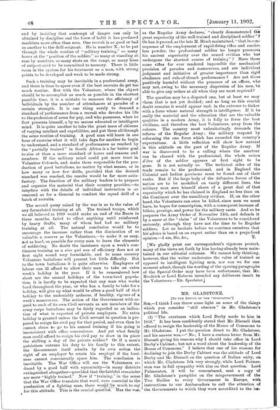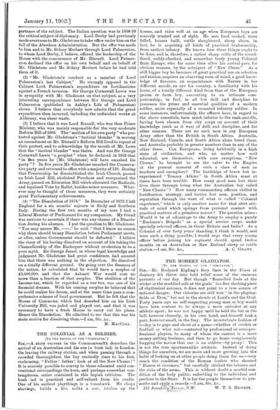MR. GLAD ST ONE.
[TO TUE EDITOR OF THE "SPECTATOR.")
think I can throw some light on some of the things which you consider " still obscure " in Mr. Gladstone's political life.
(1) " The overtures which Lord Derby made to him in 1858." It has been confidently stated that Mr. Disraeli then offered to resign the leadership of the House of Commons to Mr. Gladstone. I put the question direct to Mr. Gladstone, and his answer was,—" No; I have a curious letter from Mr. Disraeli giving his reasons why I should take office in Lord Derby's Cabinet ; but not a word about the leadership of the House of Commons." I believe that one of his, reasons for declining to join the Derby Cabinet was the attitude of Lord Derby and Mx. Disraeli on the question of Italian unity, on which Mr. Gladstone felt very strongly, while Lord Palnier- ston was in full sympathy with him on that question: Lord Palmerston, it will be remembered, sent a copy 'of Mr. Gladstone's pamphlet on the misgovernment Of the Two Sicilies to every Government in Europe; with instructions to our Ambassadors to call the- attention of the Governments to which they were accredited to the
portance of the subject. The Italian question was in 1858-59 the critical subject of diplomacy. Lord Derby had previously made overtures to Mr. Gladstone to take office under him on the fall of the Aberdeen Administration. But the offer was made to him and to Mr. Sidney Herbert through Lord Palmerston, to whom Lord Derby, I believe, offered the leadership of the House with the concurrence of Mr. Disraeli. Lord Palmer- ston declined the offer on his own behalf and on behalf of Mr. Gladstone and Mr. Sidney Herbert before he had told them of it.
(2) " Mr. Gladstone's conduct as a member of Lord Palmerston's last Cabinet." He strongly opposed in the Cabinet Lord Palmerston's expenditure on fortifications against a French invasion. Sir George Cornewall Lewis was in sympathy with Mr. Gladstone on that subject, as a very interesting correspondence between Sir George and Lord Palmerston (published in Ashley's Life of Palmerston) shows. I believe that everybody now admits that the great expenditure then incurred, including the unfinished works at Alderney, was sheer waste.
(3) I believe that it was Lord Russell, who was then Prime Minister, who was mainly responsible for the very moderate Reform Bill of 1866. The " section of his own party" who pro- tested against Mr. Gladstone's "tactical blunder " in moving an amendment on Mr. Disraeli's Reform Bill lived to repent of their protest, and to acknowledge by the mouth of Mr. Lowe that the " tactical blunder" was theirs. And was Sir George Cornewall Lewis "a prophet" when he declared in 1863 that "in five years he [Mr. Gladstone] will have smashed his party " ? In five years Mr. Gladstone smashed the Conserva- tive party and returned to office with a majority of 118. During that Premiership he disestablished the Irish Church, passed an Irish Land Bill, abolished Purchase and reorganised the Army, passed an Education Bill which alienated the Radicals, and legalised Vote by Ballot, besides minor measures. What- ever may be thought of those measures, they were certainly great Parliamentary achievements.
(4) " The Dissolution of 1874." In December of 1873 I left England for a six months sojourn in Sicily and Southern Italy. During the first two months of my tour I had a Liberal Member of Parliament for my companion. My friend was anxious to ascertain if there was any chance of a Dissolu- tion during his absence. I put the question to Mr. Gladstone. " You may assure Mr. —," he said, " that I know no reason why there should be any Dissolution before Parliament meets, or after, unless Government should be defeated." I believe the story of his having dissolved on account of his taking the Chancellorship of the Exchequer without re-election to be a pare myth. Sir George Jessel, in whose legal knowledge and judgment Mr. Gladstone had great confidence, had assured him that there was nothing in the objection. He dissolved on a totally different ground. On going over the finances of the nation, he calculated that he would have a surplus of 25,000,000, and *that the Ashanti War would cost no more than a fraction of that surplus. The abolition of the Income-tax, which he regarded as a war tax, was one of his financial dreams. With his coming surplus he believed that he could realise his dream, and at the same time pass a com- prehensive scheme of local government. But he felt that the House of Commons, which Ead deserted him on his Irish University Bill, was jaded and played out, and that it was necessary to have a fresh House to carry out his plans. Hence the Dissolution. He admitted to me that this was his main motive for dissolving then.—I am, Sir, Slc.,
M. MACCOLL.







































 Previous page
Previous page